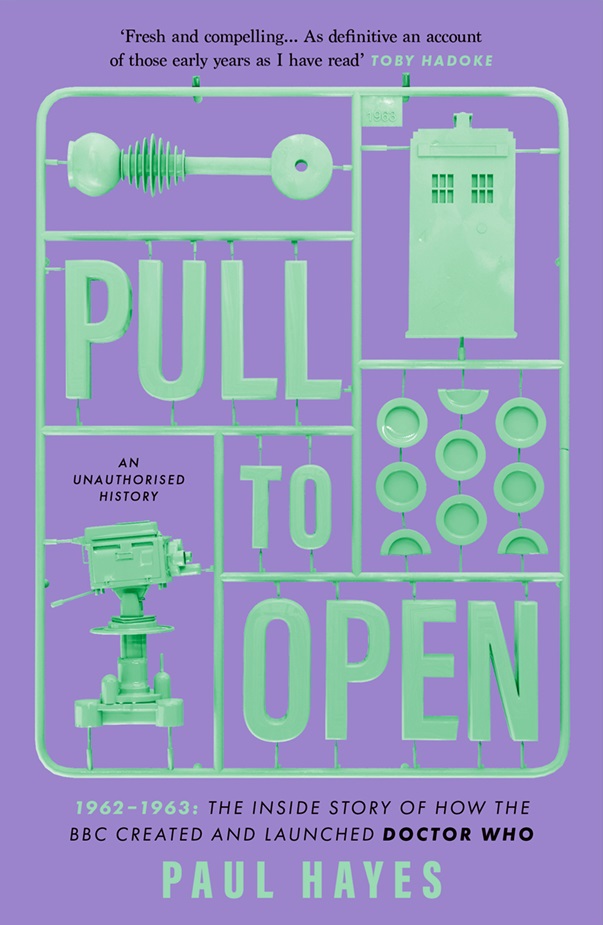A book review by Cliff Homewood
I loved Paul Hayes previous book The Long Game, an expose of the BBC behind the scenes in the 90s and Doctor Who’s fortunes during that time. This time he has tackled the creation of Doctor Who and the BBC of the 60s. A period I’ve always been interested in and covered before in well regarded books like David J Howe, Mark Stammers and Stephen James Walker’s The Sixties (cited as a source). Can one man write that which three men missed? As time goes on knowledge accumulates so a more up to date retelling of this story with his own idiosyncratic choice of detail.
Could Paul Hayes shoot lightning from his fingertips twice? Not quite, Pull to Open is meticulously researched and made me feel quite nostalgic, reading quotes from old sources like DWB. It feels like he’s read every source imaginable. With most involved no longer with us restricting him to reading biographies as opposed to interviewing. I felt the BBC became alive in his previous book in a way it never quite did in this. It was the sort of flavour of what colleagues were like to work with, that bought The Long Game to life. This dragged slightly when going into the mundane back stories of some of the key players.
The book starts by positing when did Doctor Who start? Air date? Filming date? Title sequence starting date? For me with the initial idea. The book then tells how the BBC came into being! Very interesting, a load of radio companies got together and formed it so that people would have something to listen to on their radios.
His best writing here is probably where he covers the Kennedy Assassination, unrolling in minute detail how the information hit the UK during that evening and the day after and the effect it had. The meticulous research and ability to recreate the evening, making an emotional chapter, showcasing his ability as a writer. It would fascinate a non-Doctor Who fan, the way he encapsulated the time, I had a manly tear in one eye.
Doctor Who was a flop (hitting position 114 on the chart) because of the news that day, they had the good sense to re-air the pilot a week later. If they had the sense to do that with other series we may have enjoyed a few more hits. Doctor Who: The Movie (McGann) for instance didn’t perform as well as the network hoped as it was up against a significant episode of Roseanne in America (but it still charted as the 9th highest watched show that night).
For me the world of geekdom is a safe place with sport replaced by Scifi. Instead of favourite team we have our favourite sci-fi programme. Dominated in the UK between the two titans, Doctor Who and Star Trek. Every now and then I am reminded that some geeks also like sport. How dare they? The writer of this book is one such geek. I really enjoy his attempt to contextualise the making of Who with what’s happening in the outside world, but sport doesn’t interest me. There was also the odd typographical error.
Not as enjoyable as his previous, full of anecdotes and tales bringing the BBC and its culture to life. This felt more clinical, poring over old documents, suffering from the writer’s inability to speak to those involved to get a real feel of life in the BBC at the time as opposed to the world around. He states Sydney Newman would ‘have found it far more difficult to gain a senior position in British television.’ Why? One assumes racism as the sentence follows those discussing British racism. Or is it the class system, or is the class system racism in disguise?
In the book the Director Don Taylor having been offered Doctor Who is quoted as saying, ‘I told him I’ve never had the slightest interest in science fiction, and if I wanted to do plays about the past, I didn’t need a time traveller to take me there.’ This is the nearest thing for getting you there, 1963 circa Doctor Who.

